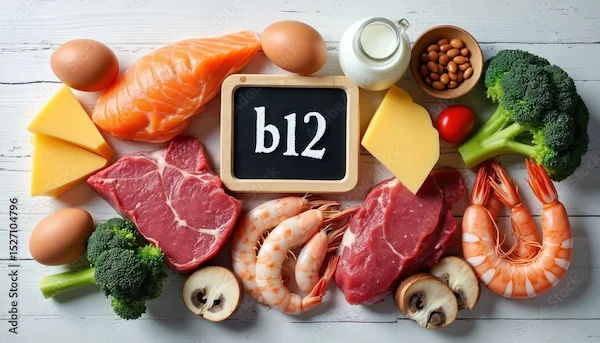Signs of Vitamin B12 Deficiency
Know about the cardinal signs of vitamin B12 deficiency, what to do to prevent the deficiency and when to see a specialist


Introduction
Vitamin B12 is an essential nutrient that plays a crucial role in keeping your body healthy. It helps in making red blood cells, maintaining nerve function, and supporting brain health. However, many people don’t get enough of this vital vitamin, leading to a deficiency that can cause serious health problems if left untreated.
In this article, we’ll discuss the common signs of Vitamin B12 deficiency, its causes, and how you can manage or prevent it.
What Are the Signs of Vitamin B12 Deficiency?
Vitamin B12 deficiency can develop slowly, and symptoms may appear gradually. Some common signs include:
1. Fatigue and Weakness
One of the earliest signs is feeling unusually tired or weak, even after a good night’s sleep. This happens because your body doesn’t have enough red blood cells to carry oxygen efficiently.
2. Pale or Yellowish Skin
A lack of B12 can lead to a condition called megaloblastic anaemia, where red blood cells are abnormally large and fragile. This can make your skin look pale or slightly yellow (jaundice).
3. Numbness or Tingling in Hands and Feet
Vitamin B12 is essential for nerve health. A deficiency can cause nerve damage, leading to tingling, numbness, or a "pins and needles" sensation in your hands and feet.
4. Difficulty Walking and Balance Problems
If the deficiency affects your nerves severely, you may experience difficulty walking, poor balance, or even muscle weakness.
5. Memory Problems and Confusion
Low B12 levels can impact brain function, leading to memory loss, difficulty concentrating, or even mood changes like depression and irritability.
6. Mouth Ulcers and Glossitis (Swollen Tongue)
Some people develop painful mouth ulcers or a swollen, red tongue (glossitis), making eating uncomfortable.
7. Vision Problems
In rare cases, untreated B12 deficiency can damage the optic nerve, leading to blurred or disturbed vision.
Consult Top Specialists for Personalised Tips
Who Is at Risk of Vitamin B12 Deficiency
Certain groups of people are more likely to develop a B12 deficiency:
Vegetarians and Vegans: Since B12 is mainly found in animal products, those who don’t consume meat, eggs, or dairy are at higher risk.
Older Adults: As we age, our stomach produces less acid, which is needed to absorb B12 from food.
People with Digestive Disorders: Conditions like Crohn’s disease, celiac disease, or gastric bypass surgery can interfere with B12 absorption.
Long-Term Users of Certain Medications: Some acid-reducing drugs (like PPIs) and diabetes medications (like metformin) can lower B12 levels.
How Can You Manage or Prevent Vitamin B12 Deficiency?
1. Eat B12-Rich Foods
Include these in your diet:
Meat (beef, chicken, liver)
Fish (salmon, tuna)
Eggs and dairy products (milk, cheese, yoghurt)
Fortified cereals and plant-based milk (for vegetarians/vegans)
2. Consider Supplements
If you’re at risk, your doctor may recommend B12 supplements in the form of tablets, injections, or nasal sprays.
3. Get Regular Check-ups
If you experience symptoms, consult a doctor. A simple blood test can confirm B12 deficiency.
4. Avoid Excessive Alcohol
Heavy drinking can interfere with nutrient absorption, including B12.
When Should You See a Doctor?
If you notice persistent symptoms like extreme fatigue, numbness, or memory issues, it’s important to get tested. Early detection and treatment can prevent long-term complications like nerve damage or anaemia.
Final Thoughts
Vitamin B12 deficiency is common but often overlooked. Recognising the signs early and making simple dietary or lifestyle changes can make a big difference in your health. If you’re experiencing any symptoms, don’t ignore them. Then do not talk to a healthcare provider and take the necessary steps to stay healthy!
Consult Top Nutritionists
Consult Top Specialists for Personalised Tips
Ms. Lakshmi Tejasvi
Clinical Nutritionist
14 Years • M.Sc - Clinical Nutrition
Hyderabad
Vibgyor Nutri, Hyderabad

Dr. Bhukya Pavan Kalyan
General Physician
5 Years • MBBS DNB Paediatrics
Bengaluru
PRESTIGE SHANTHINIKETAN - SOCIETY CLINIC, Bengaluru
Mrs Sneha P V
Nutritionist
10 Years • Master of science in Food and Nutrition
Bengaluru
Apollo Clinic, Sarjapur Road, Bengaluru

Dr. Ramalinga Reddy
General Physician
5 Years • MBBS MD General medicine
Bengaluru
PRESTIGE SHANTHINIKETAN - SOCIETY CLINIC, Bengaluru
Dt. Ila Sharma
Clinical Nutritionist
18 Years • Master in food & Nutrition
Gurugram
VIPUL GREENS - SOCIETY CLINIC, Gurugram
Consult Top Nutritionists
Ms. Lakshmi Tejasvi
Clinical Nutritionist
14 Years • M.Sc - Clinical Nutrition
Hyderabad
Vibgyor Nutri, Hyderabad

Dr. Bhukya Pavan Kalyan
General Physician
5 Years • MBBS DNB Paediatrics
Bengaluru
PRESTIGE SHANTHINIKETAN - SOCIETY CLINIC, Bengaluru
Mrs Sneha P V
Nutritionist
10 Years • Master of science in Food and Nutrition
Bengaluru
Apollo Clinic, Sarjapur Road, Bengaluru

Dr. Ramalinga Reddy
General Physician
5 Years • MBBS MD General medicine
Bengaluru
PRESTIGE SHANTHINIKETAN - SOCIETY CLINIC, Bengaluru
Dt. Ila Sharma
Clinical Nutritionist
18 Years • Master in food & Nutrition
Gurugram
VIPUL GREENS - SOCIETY CLINIC, Gurugram




